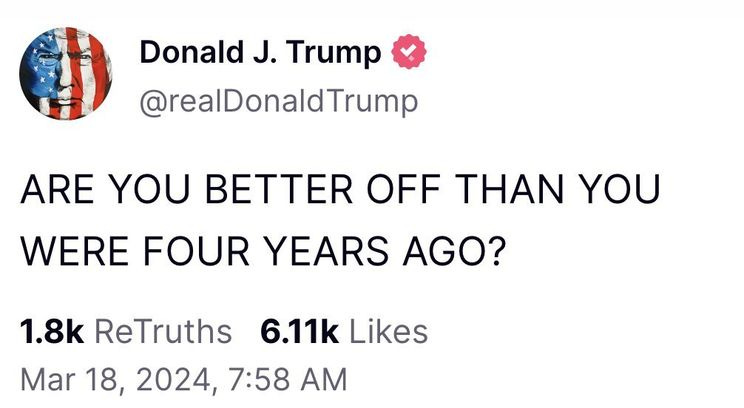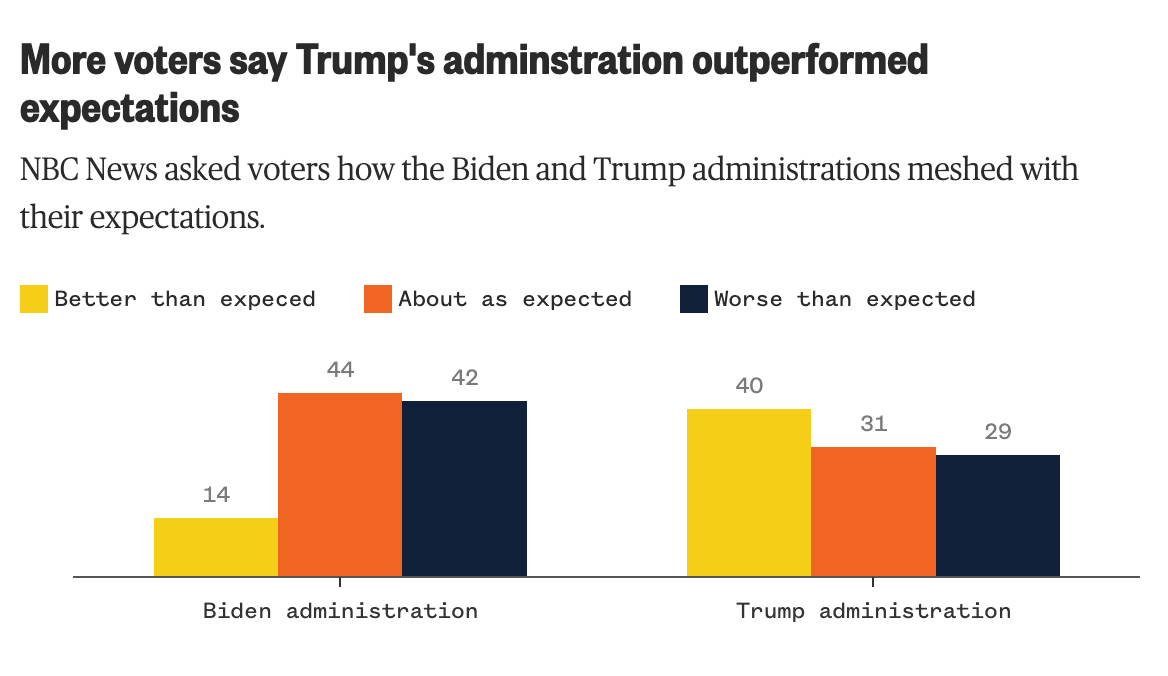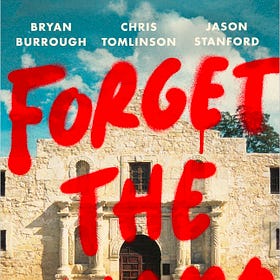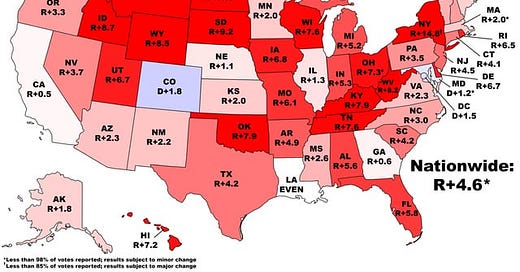
Donald Trump is making America forget Donald Trump
We're suffering from "Trump Amnesia." Here's why:
This is the always free, reader-supported weekend edition of The Experiment, your official hopepunk newsletter. If you’d like to support my work, become a paid subscriber or check out the options below. But even if you don’t, this bugga free. Thanks for reading!
I felt like my life was over when I turned 50, but actually it was the world that was ending. The World Health Organization declared a pandemic on my 50th birthday. Though the two events did not share a causal relationship, they are highly correlated in my memories. On the way to dinner with my family, we learned Tom Hanks and Rita Wilson had contracted COVID. March Madness was cancelled during dessert. The rest of the year thrummed with anxiety and anger, especially when it came to Donald Trump’s traumatic mishandling of the crisis.
“I think it’s under control,” he told Jonathan Swann of Axios in September of that year.
“How? A thousand Americans are dying a day,” Swan said.
“They are dying. That’s true. And you – it is what it is,” Trump said.
“Well, it is what it is because you are who you are. That’s why it is. The President has no plan,” said Joe Biden in a debate later. “He said he didn’t tell us or give people a warning of it because he didn’t want to panic the American people. You don’t panic. He panicked.”
The “it is what it is” was a huge deal back then, or as Trump would say, huge, the biggest ever. But I had completely forgotten about it until I ran across it just now. I forgot how Trump tried to bully Biden in the chaotic debate but instead was unmanned by Biden’s “Will you shut up, man?” and “Keep yapping.” My Facebook memories from 2020 fool me into a false confidence of my own recall, but all I can accurately recall is the constant thrum.
Apparently I’m not the only one whose memories have lost their snap. A lot of us are even thinking things were better back then, global recession and lockdowns notwithstanding. Why, on March 18 of this year no less than Trump, the All Caps Drunk Uncle in Chief himself, asked on Truth Social, “ARE YOU BETTER OFF THAN YOU WERE FOUR YEARS AGO?”
I mean, yes? I have a job for a school district where kids get to sit in classrooms without masks. My wife just went to two conferences in the last two weeks, one in Vegas and one in DC, and I didn’t spend a second worrying that an un-vaxed debate-me bro would infect her with the plague. Toilet paper is abundant on store shelves, and—I cannot underscore how important this is—the Baltimore Orioles are, according to one publication, a “great baseball club that looks like a prep school lacrosse team.” So yes, I am much better off than I was four years ago.
And so are most of you, which is why Biden rushed to repeat the question, sounding more like Uncle Joey B in the process.
“Speaking of Donald Trump, just a few days ago, he asked the famous question at one of his rallies: Are you better off today than you were four years ago?” Biden told donors this week. “Well Donald, I’m glad you asked that question, man, because I hope everyone in the country takes a moment to think back when it was like in March of 2020.”
But this is increasingly a minority opinion, and for the most bizarre reason ever: The Trump presidency is more popular than ever as a slight majority of Americans approve of the job he did as president, which is something that never happened when he was president. Forget COVID. The hot new pandemic is Trump Amnesia.
Part of this is the normal post-presidency rebound that all presidents enjoy when they are out of office and, with one notable exception, doing good works.
The shift in the perception of Mr. Trump is not unusual: Presidents are typically viewed in a better light after leaving office. President George W. Bush’s average approval rating while in office was 49 percent; voters now give him a 57 percent approval rating for his time in the White House. And President Barack Obama received a 15 percentage point bump after leaving the White House, according to Gallup.
But unlike Bush and Obama, this one is running again.
We’re also grading Trump’s presidency on a curve, with more Americans thinking his administration exceeded expectations than think he did worse than expected. And to be honest, Trump did not end his presidency living in exile in Russia. Except for the million-plus Americans who died from COVID, we survived the Trump presidency. He didn’t start a nuclear war. So yes, things went better than I expected, too. Americans on average expected far less from Trump than they do, or did, of Biden. That Trump made a mess of things shocked few; that Biden hasn’t fix it all disappoints many.
Semafor’s Dave Weigel says another factor at play is “nostalgia for the first three years of his presidency,” which may be true if you’re just thinking of the stock market, but that’s whistling past the graveyard of his other signature policies that led to the Democrats’ massive wins in the 2018 midterms. Before COVID, Trump was merely a dizzyingly stupid man who humped the legs of dictators and rage-tweeted cable news in the middle of the night. Amnesia, and not nostalgia, is the only explanation for thinking things were better then.
A lot of folks have puzzled over the reverse phenomenon. Things are objectively pretty good right now, but people remain stubbornly PO’d about it. Plotted from the messy venality and incompetence of the Trump years to the relative peace and prosperity of the Biden presidency, things in this country are moving in the right direction. But a majority of Americans say they most assuredly are TF not, and partisan reasoning does not explain all of this.
Last month, The Atlantic published an essay by two clinical psychologists that I haven’t been able to stop thinking about. They argue that we are suffering the effects of not having mourned what we lost in the pandemic as a country.
As clinical psychiatrists, we see the effects of such emotional turmoil every day, and we know that when it’s not properly processed, it can result in a general sense of unhappiness and anger—exactly the negative emotional state that might lead a nation to misperceive its fortunes.
In other words, and to paraphrase James Carville, It’s not the economy, stupid. It’s COVID. We moved on before we were ready because the pressures to put it behind us—to return to normal, we all said—was so great. We needed to not live in a funhouse America where we had to wear masks to go to the bank. But while we started doing normal things again, a lot of us didn’t return to feeling normal, and so our “free-floating sadness and anger,” they write, had to find something to blame.
In the early days of the pandemic, President Donald Trump mishandled the crisis and peddled misinformation about COVID. But with 2020 a traumatic blur, Trump seems to have become the beneficiary of our collective amnesia, and Biden the repository for lingering emotional discontent.
Trump probably didn’t realize how lucky he was on my birthday this year that marked four years since the beginning of the coronavirus pandemic. Had Biden declared a day of remembrance for what we went through back then—and more importantly, how we got past it—we could have started to tell ourselves a better story than just being vaguely unsatisfied with the state of things. Biden could even have given Trump credit for Operation Warp Speed which lead to the quick creation of effective vaccines.
There is still time, however, and plenty of milestone anniversaries to mark our passage from danger and to celebrate our arrival at a safe time, at least from the plague. It’s ironic that the popular caricature is of a daft and addled Biden, unable to remember things and making a general mess of things when in fact that is us. Biden remembers things clearly, the odd name of a foreign world leader notwithstanding. It’s his grumpy countrymen who are suffering from “collective amnesia,” unable to recall clearly just how awful things used to be and thus unable to see that things aren’t all bad right now. In fact, they’re almost, dare I say, pretty dang good.
Jason Stanford is a co-author of NYT-best selling Forget the Alamo: The Rise and Fall of an American Myth. His bylines have appeared in the Washington Post, Time, and Texas Monthly, among others. Follow him on Threads at @jasonstanford, or email him at jason31170@gmail.com.
Further Reading
The new normal is worse than you think. So why does Ryan Holiday say you should not be afraid?
Sprachspiel
We set up a merch table in the back where you can get T-shirts, coffee mugs, and even tote bags now. Show the world that you’re part of The Experiment.
We’ve also got a tip jar, and I promise to waste every cent you give me on having fun, because writing this newsletter for you is how I have fun.
Buy the book Texas Lt. Gov. Dan Patrick banned from the Bullock Texas History Museum: Forget the Alamo: The Rise and Fall of the American Myth by Bryan Burrough, Chris Tomlinson, and myself is out from Penguin Random House. The New York Times bestseller is out in paperback now!



















